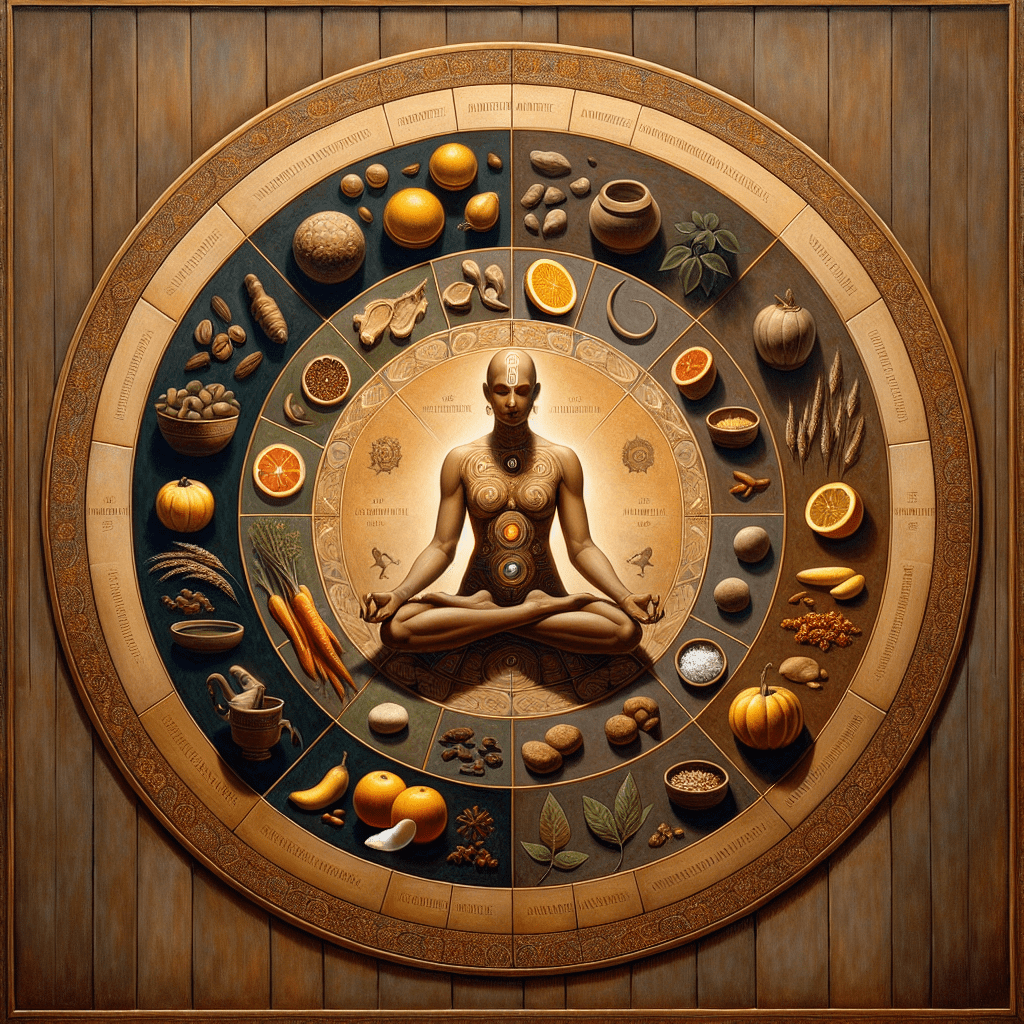Have you ever noticed how strawberries taste incredibly sweet and juicy in summer but can be disappointingly bland in winter? Or how your body seems to crave warm soups when temperatures drop and lighter, cooling foods when it’s hot outside? These natural preferences aren’t coincidental—they’re your body’s innate wisdom guiding you toward seasonal eating.
Seasonal eating is more than just a trendy food movement. It’s an ancient practice that involves consuming foods during their natural harvest time. This approach aligns our bodies with nature’s rhythms and cycles, creating harmony between what we eat and what our bodies need at different times of the year. Traditional Chinese Medicine (TCM), with its 2,000-year history, has long emphasized this connection, viewing seasonal eating as essential for maintaining balance and optimal health.
In our modern world of year-round availability of virtually any food, we’ve lost touch with nature’s perfect timing. But what if this disconnect is quietly affecting your health, energy levels, and overall wellbeing? Let’s explore how returning to seasonal eating patterns might be the missing piece in your wellness puzzle.
Why Seasonal Eating Makes Sense from a Traditional Perspective
Traditional Chinese Medicine views humans as microcosms of the natural world—what happens in nature should be reflected in our bodies. Each season brings distinct energy patterns, and our dietary choices should support these changes rather than fight against them.
According to TCM, our bodies are constantly striving for balance. When we eat foods that are naturally available during specific seasons, we help our bodies adapt to environmental changes more effectively. This creates harmony between our internal systems and the external world—a cornerstone concept in Eastern healing traditions.
“Seasonal eating keeps the body in sync with nature,” explains many TCM practitioners. This synchronicity isn’t just philosophical—it translates to tangible health benefits that modern nutrition science is increasingly validating.
The Health Benefits of Seasonal Eating: More Than Just Fresher Taste
When you choose seasonal foods, you’re not just getting better flavor—you’re receiving profound health benefits that address your body’s changing needs throughout the year.
Peak Nutrition When You Need It Most
Seasonal produce is typically harvested at its peak ripeness, when nutrient content is highest. Studies have shown that fruits and vegetables can lose significant nutritional value when transported long distances or stored for extended periods. By eating seasonally, you’re getting more vitamins, minerals, and antioxidants per bite.
For example, vitamin C-rich foods are abundant in winter when our immune systems need additional support. Nature provides exactly what we need, exactly when we need it.
Enhanced Digestion and Energy Flow
TCM places enormous importance on digestive health as the foundation for overall wellness. Seasonal eating supports optimal digestion in several ways:
- Seasonal foods are fresher and easier for your body to process
- They contain the energetic properties needed for the current season
- They help maintain proper “Qi” (vital energy) flow throughout the body
Many people report reduced bloating, improved energy levels, and better digestive function when they align their diets with the seasons. This makes perfect sense from a TCM perspective, which views proper digestion as essential for converting food into usable Qi.
Better Adaptation to Environmental Changes
Each season brings different challenges to our bodies—from cold winter winds to summer heat. Seasonal foods help our bodies adapt to these changes naturally. For instance, cooling foods like cucumber and watermelon in summer help counteract external heat, while warming foods like ginger and sweet potatoes in winter help maintain internal warmth when temperatures drop.
This adaptive quality of seasonal eating helps reduce seasonal health complaints and fatigue, keeping your energy stable throughout the year.
Seasonal Foods Guide: Eating in Harmony with Nature Year-Round
Spring: The Season of Renewal and Growth
Spring represents new beginnings in nature, and our bodies benefit from foods that support cleansing and renewal after winter.
Recommended spring foods include:
- Leafy greens like spinach, kale, and Swiss chard
- Sprouts and young plants
- Onions, leeks, and green onions
- Fresh herbs like cilantro and mint
- Light proteins like chicken and fish
These foods help gently stimulate liver function (the organ TCM associates with spring) and support the body’s natural detoxification processes. They’re often lighter and more bitter, helping to clear the heaviness that may accumulate during winter. Seasonal vegetable charts can help you identify the best options available.
A simple spring recipe might include stir-fried baby bok choy with ginger and a small amount of lean protein—light, fresh, and perfect for the season’s energy.
Summer: Cooling Foods for Peak Activity
Summer brings heat and high activity levels. The body benefits from cooling, hydrating foods that prevent overheating and support increased movement.
Recommended summer foods include:
- Water-rich fruits like watermelon, berries, and peaches
- Cooling vegetables like cucumber, zucchini, and eggplant
- Fresh salads and lightly cooked dishes
- Mint, chrysanthemum, and other cooling herbs
- Light, easy-to-digest proteins
TCM associates summer with the heart and small intestine, which benefit from these cooling, easy-to-process foods. “Cooling foods like cucumbers and melons are ideal for summer,” note TCM practitioners, as they help maintain internal balance despite external heat.
Summer meals are best when light and refreshing—think cucumber and watermelon salad with mint, or lightly steamed vegetables with a cooling dip.
Late Summer/Early Fall: The Earth Phase
In TCM, there’s a fifth season—late summer or early harvest season—associated with the Earth element and the digestive organs (Stomach and Spleen).
Recommended late summer/early fall foods include:
- Sweet vegetables like carrots and sweet potatoes
- Mildly sweet fruits like apples and pears
- Whole grains like millet and rice
- Moderate amounts of meat and legumes
- Warming spices like ginger and cinnamon
These foods support digestive function and help prepare the body for the transition to cooler weather. “This mini-season often gets skipped, but it matters in TCM,” as it helps stabilize the body between the extremes of summer and winter.
A nourishing late summer meal might include roasted root vegetables with moderate warming spices and a small portion of protein—grounding and centering foods that support digestion.
Fall: Gathering and Building Reserves
Fall is harvest time, when nature gathers energy for the coming winter. Our bodies benefit from foods that support lung health (the organ system TCM associates with fall) and begin building reserves.
Recommended fall foods include:
- Root vegetables like turnips, carrots, and parsnips
- Hearty grains like quinoa and oats
- White foods like cauliflower and white mushrooms (associated with lung health in TCM)
- Pears and apples (particularly good for lung health)
- Moderate amounts of high-quality protein
These foods help strengthen the lungs and large intestine while preparing the body for colder weather. They’re typically more substantial than summer foods but not as heavily warming as winter choices.
Fall meals often feature roasted vegetables, hearty soups, and grain bowls—substantial without being too heavy.
Winter: Warming Foods for Energy Conservation
Winter is a time of energy conservation in nature, and our bodies benefit from warming, nutrient-dense foods that support the kidneys (the organ system TCM associates with winter).
Recommended winter foods include:
- Warming soups and stews
- Root vegetables and winter squashes
- Nuts and seeds
- Warming spices like cinnamon, cardamom, and ginger
- Slow-cooked meats and bone broths
These foods provide sustained energy and warmth during the coldest months. “Warming foods like sweet potatoes and ginger are better suited for winter,” helping maintain internal heat when external temperatures drop.
Winter meals tend to be more substantial and warming—think hearty bean soups, roasted winter squash with warming spices, and slow-cooked stews that nourish deeply.
The Holistic Benefits of Seasonal Eating: Beyond Physical Health
Embracing seasonal eating doesn’t just support physical health—it creates a ripple effect of benefits throughout your entire life.
Environmental Connection and Mindfulness
When you eat seasonally, you become more attuned to the natural world around you. This awareness fosters a deeper connection to your environment and can increase mindfulness about food choices. Many find that seasonal eating helps them develop a more conscious relationship with food overall.
“Seasonal eating keeps the body in sync with nature, with lighter greens in spring, cooling fruits in summer, and warming stews in winter,” creating a natural rhythm to your eating patterns that feels intuitively right.
Emotional and Mental Wellbeing
TCM recognizes that each season affects not just physical health but emotional states too. Seasonal foods help balance these emotional tendencies:
- Spring foods help release stagnant emotions and support new beginnings
- Summer foods cool excessive excitement and support joy
- Late summer/early fall foods ground anxiety and support contentment
- Fall foods help process grief and support letting go
- Winter foods calm fear and support introspection
This emotional balancing act contributes to more stable mood patterns throughout the year and supports overall mental wellbeing.
Community and Cultural Connection
Seasonal eating naturally encourages support of local farmers and food systems. When you shop at farmers’ markets or join CSA programs, you’re not just getting fresher food—you’re building community connections and preserving cultural food traditions that revolve around seasonal celebrations.
This aspect of seasonal eating creates a sense of belonging and continuity that’s increasingly rare in our fast-paced world but deeply nourishing on multiple levels.
Embracing Seasonal Eating in Modern Life: Practical Steps
- Start with local farmers’ markets to discover what’s truly in season in your area
- Add before subtracting by incorporating seasonal foods alongside your regular diet
- Learn simple preservation techniques like freezing or fermenting to extend seasonal abundance
- Use seasonal eating guides specific to your region
- Experiment with new recipes that highlight seasonal ingredients
Remember that seasonal eating isn’t about perfection—it’s about gradually aligning more closely with natural cycles for better health and wellbeing.
Modern Technology Meets Ancient Wisdom: The HerbalsZen Approach
At HerbalsZen, we believe in bridging ancient wisdom with modern innovation to support optimal health. Our EASTCHI AI system integrates the time-tested principles of seasonal eating from Traditional Chinese Medicine with cutting-edge technology to provide personalized recommendations tailored to your unique constitution and the current season.
Rather than following generic dietary advice, EASTCHI AI analyzes your constitutional type through Five Element Theory, considering factors like your body’s tendencies, current health status, and seasonal influences. This personalized approach helps you apply seasonal eating principles in a way that’s specifically beneficial for your body.
Just as TCM has recognized for thousands of years that “food is medicine,” EASTCHI AI helps you identify which seasonal foods will act as medicine for your particular constitution. This personalized guidance makes incorporating seasonal eating principles more effective and sustainable.
Conclusion: Nature’s Perfect Timing for Better Health
Seasonal eating isn’t just a trend—it’s a return to a natural way of eating that humans followed for thousands of years before global food transportation became commonplace. By reconnecting with nature’s rhythms through your food choices, you can support your body’s innate wisdom and potentially resolve health issues that stem from being out of sync with natural cycles.
As you begin exploring seasonal eating, pay attention to how your body feels when you consume foods at their peak season. You may notice improved digestion, more stable energy, better sleep, and a general sense of alignment that comes from working with—rather than against—nature’s perfect timing.
Remember that each meal is an opportunity to harmonize with the natural world around you. By choosing seasonal foods, you’re not just nourishing your body—you’re participating in an ancient tradition of living in balance with nature that may be exactly what your modern life has been missing.




